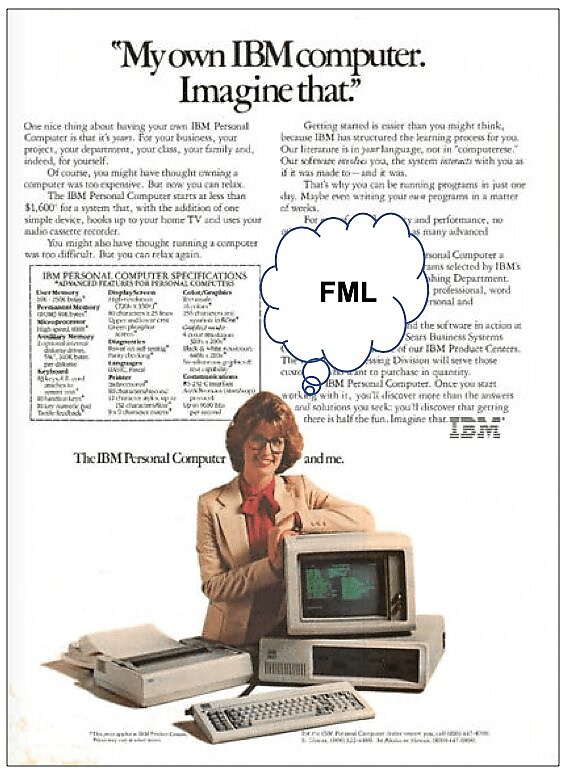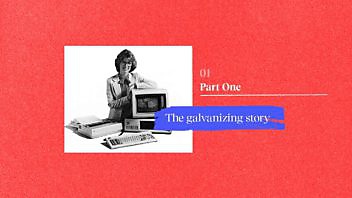What the hell just happened?
I don’t know about you but I feel like I’ve just been spat out of a spinning tumble drier.
When I went into marketing (Madison Avenue, 1984), things were so simple.
Big ideas.
Ad campaigns.
Media.
Repeat.
Weirdly, I loved it. Trying to distill the essence of what a brand really meant to its customers. Spinning that essence into a mini-story called a commercial or print ad. Distilling it further into a strapline (the haiku of marketing).
Then I got moved onto a B2B account: AT&T, post-monopoly. The Information Systems bit. (Minicomputers. Networks.)
And I got the B2B bug.
Learning about technology. Building rational arguments to get business people to change the way they did things. It felt more honorable, less icky, than trying to convince mothers that using fabric softener would make them better mothers.

B2B marketing was still simple:
Idea.
Ad campaign.
Media (invariably the trade press).
Maybe some direct mail.
Maybe some PR.
Repeat.

Then all hell broke loose.
First, The Big One: the Internet. The Web. Email. Then social media. Analytics. CRM. Marketing automation. Programmatic
(I remember thinking about my career just as digital broke. I pictured myself standing on a dock, with one foot on the solid planks and the other in a boat that was floating away. Stay ashore or jump in? Reader, I jumped.)
In the space of a few years (maybe five?), almost every single thing about marketing had changed. Not evolved. Totally shape-shifted.
Then the Other Big One: content marketing. A whole new way to build a relationship with prospects and customers. (Well, an old way but completely re-engineered for the digital era).
And it was fun as hell.
We were all on a mission to overthrow the reactionary forces of old marketing in favor of this new, customer-led, content-rich one.
And we were all on the same steep learning curve together. Sharing our ideas and experiences in the same new channels we were learning about. Channels with portmanteau names like ‘blog’ (‘web log’ kids) or ‘webinar’ (yuck). Comparing notes at conferences. Hauling our arses to Cleveland god-damn Ohio (and discovering it’s a cooler city than we were told on the coasts).
We were all part of the revolution. I remember the taste of venom as I spat-typed the phrase ‘old-school, interruptive, broadcast marketing’ (Greek Chorus: gasp!!) and described the new ‘customer-led, value-exchanging engagement’ (Angel chorus: ah-Ahhh!”).
Together, we were writing the new rules and preaching them to fellow converts, like the repetitions of a catechism.
A new dogma started to emerge. New processes congealed into ‘best practices’.
The different experiences of many practitioners started to coalesce into a new playbook.
Then the worst thing that can happen to any revolution… happened.
We won
After battering away at the ramparts of legacy marketing, the defenses simply collapsed. They let us in.
Content marketing won.
It went mainstream.
It became industrialized.
No self-respecting agency, no matter what niche they were in, could afford to leave the word ‘content’ off the home page.
In every client-side marketing team, people started popping up with the c-word on their business cards.
Even the most conservative companies scrambled to get good at content. And to produce lots and lots of it.
Dad started to dance.
Heady times. But silly times too.
For the first few years of the CM Era, the only real KPI was the Metric Ton and the only question was, “How much of this stuff can we make and how fast?”.
As busy as all this production kept us, it also made us lazy. In the excitement of getting the virtual presses rolling, we weren’t slowing down to track the actual impact of all this content. We all knew we should. But we didn’t have to. So we didn’t.
(Yes, there was a lot of talk about tracking everything through to revenue, but very, very few B2B marketing teams actually tried to do it—and fewer still succeeded).
The flood
The not-so-surprising result: a deluge of Crap. (I won’t say, ‘Told you so’) (Except by saying I won’t say it).
And, thanks to the deluge, the fresh, new thing that didn’t look, smell and taste like marketing started to look, smell and taste like marketing.
That ebook on Rethinking Supply Chain Management was no longer a surprising, insightful contribution to the discipline. It started to look like a brochure in disguise.
And the disguise sucked. Buyers saw right past the fake-nose-and-moustache combo and spotted the marketer caught in the act of marketing.
Yes, there were (and are still) lots and lots of really good pieces of content produced by B2B brands. Pieces that work hard to deliver real value. To leverage the company’s earned expertise to help prospects do their jobs better.
The problem: from the cover and the landing pages, the good stuff and the bad stuff look pretty much identical.
For brands that earned a reputation as a producer of smart, helpful, entertaining content, the value of content stayed high. The respect they showed for their audiences paid off.
For everyone else, the street value of an ebook started to sag faster than local opioid prices after the Purdue Pharma truck passed through town.
So what’s next?
We may not have killed the golden goose, but we clipped its wings pretty dang good.
And that is where we are today.
Today, content alone can’t be the only thing B2B marketers think about.
While it made sense to over-index on content as we learned how it worked, we now need to let the pendulum return to the center.
Content has to take its place in the overall marketing strategy. Done right, it often deserves a central role. (This was never a fad—and the concept of ‘content-free marketing’ doesn’t bear thinking about.)
So what’s at the center of B2B marketing today?
It’s tempting to say Performance Marketing—and it’s true that our discipline is very much about accountability and data and revenue.
But what’s at the center of all these dashboards and data and revenue models?
It’s what should have been there throughout all the turmoil we just lived through.
It’s what always drove the best “old-school, interruption-based, broadcast marketing”.
It’s what always drove the most effective digital marketing.
And it’s the thing that defines the very best content marketing too, separating it from the rest as clearly and distinctly as an apple in a bowl of rocks.
The new thing—the next thing—is the oldest thing in marketing:
The big, fresh, surprising, magnetic idea.
Expressed in what we like to call a galvanizing story.
Sounds so bloody obvious. Trite even.
But look around: see how few B2B brands have one.
The single most powerful thing a brand can have is also, today, one of the rarest.
In the next post, I talk about what a galvanizing story is, why it’s so powerful and what good ones look like.
And in the post after that, I dissect an example: a galvanizing story that made a big difference to a tech company facing the same challenges that your company is facing.
Through this series, I hope to goad you into taking a cold, hard look at your own marketing—asking yourself whether your brand has a galvanizing story, or just a slogan, a USP or a ‘story framework’ buried deep in some powerpoint deck. (C’mon, you’re better than that).
Enjoyed this article?
Take part in the discussion









Comments
Sherlock Holmes April 29th, 2019
“Excellent article” is too impotent of a comment for this blog series; as a gesture of gratitude, I am doing an emphasis comment-series.
This comment emphasizes the overarching point of this article.
—
Think of all the coming-soon sexy in the B2B marketing ecosystem; the developing micro-macro strategies, the upcoming mediums to execute those strategies in, and the futuristic tools (MarTech stacks) to promote and examine those strategies with.
(Don’t just lower your eyeball and read the rest of the comment. Think!)
(You don’t listen, don’t you? Ok, have it your way.)
Micro Strategy? ABM & Performance marketing. Macro Strategy? Funnel to Flywheel model.
Tools? Predictive Analytics. Data Integration and Visualization.
Mediums? VR. AR. Voice Search.
All are, for, and about…
Starts, ends and revolves around…
CONTENT!
Content, until me and you retire, is not going anywhere. And “content losing the game” is not the point that Doug is trying to make here.
The point is that the content marketing bubble has exploded. And as content once gave us a direction for our marketing, now we need a new direction for our content and for our marketing.
A direction where a galvanizing story of our brand can help us move towards.
Doug Kessler May 1st, 2019
This gives Insanity the good name it deserves.
Love the Comment Series idea!
Going to read #2 now.
Thanks!
Jax July 30th, 2021
The first thing you should look for in reviews about essay services is whether they offer a full refund if you are not satisfied with their service. A growing number of people are reporting that they are no longer satisfied with the services provided by the essay editing companies that they’ve hired. It seems that once students sign on for a particular service, that particular company becomes almost inseparable from the students’ academic performance. And if you can’t exchange your money for a refund after a few months, that says a lot about the quality of the services you’re getting from the essay editing service. Avoid those companies that don’t offer a full and complete refund, because chances are, you won’t be able to get a refund at all.